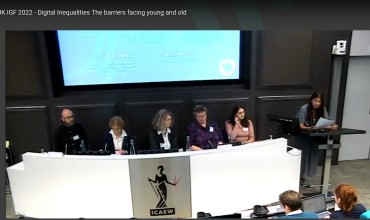Assume a spherical cow
 The early months of 2020 were a time of radical uncertainty - that is, decisions had to be made that affected the lives of whole populations where little guidance was available. As Leonard Smith and David Tuckett explained at their 2018 conference on the subject (and a recent Royal Society scientific meeting) decisions under radical uncertainty are often one-offs whose lessons can't inform the future. Tuckett's and Smith's goal was to understand the decision-making process itself in the hope that this part of the equation at least could be reused and improved.
The early months of 2020 were a time of radical uncertainty - that is, decisions had to be made that affected the lives of whole populations where little guidance was available. As Leonard Smith and David Tuckett explained at their 2018 conference on the subject (and a recent Royal Society scientific meeting) decisions under radical uncertainty are often one-offs whose lessons can't inform the future. Tuckett's and Smith's goal was to understand the decision-making process itself in the hope that this part of the equation at least could be reused and improved.
Inevitably, the discussion landed on mathematical models, which attempt to provide tools to answer the question, "What if?" This question is the bedrock of science fiction, but science fiction writers' helpfulness has limits: they don't have to face bereaved people if they get it wrong; they can change reality to serve their sense of fictional truth; and they optimize for the best stories, rather than the best outcomes. Beware.
In the case of covid, humanity had experience in combating pandemics, but not covid, which turned out to be unlike the first known virus family people grabbed for: flu. Imperial College epidemiologist Neil Ferguson became a national figure when it became known that his 2006 influenza model suggesting that inaction could lead to 500,000 deaths had influenced the UK government's delayed decision to impose a national lockdown. Ferguson remains controversial; Scotland's The Ferrett offers a fact check that suggests that many critics failed to understand the difference between projection and prediction and the importance of the caveat "if nothing is done". Models offer possible futures, but not immutable ones.
As Erica Thompson writes in her new book, Escape From Model Land: How Mathematical Models Can Lead Us Astray and What We Can Do About It, models also have limits that we ignore at our peril. Chief among them is the fact that the model is always an abstracted version of reality. If it weren't, our computers couldn't calculate them any more than they can calculate all the real world's variables. Thompson therefore asks: how can we use models effectively in decision making without becoming trapped inside the models' internal worlds, where their simplified assumptions are always true? More important, how can we use models to improve our decision making with respect to the many problems we face that are filled with uncertainties?
The science of covid - or of climate change - is only a small part of the factors a government must weigh in deciding how to respond; what science tells us must be balanced against the economic and social impacts of different approaches. In June 2020, Ferguson estimated that locking down a week earlier would have saved 20,000 lives. At the time, many people had already begun withdrawing from public life. And yet one reason the government delayed was the belief that the population would quickly give in to lockdown fatigue and resist restrictions, rendering an important tool unusable later, when it might be needed even more. This assumption turned out to be largely wrong, as was the assumption in Ferguson's 2006 model that 50% of the population would refuse to comply with voluntary quarantine. Thompson calls this misunderstanding of public reaction a "gigantic failure of the model".
What else is missing? she asks. Ferguson had to resign when he himself was caught breaking the lockdown rules. Would his misplaced belief that the population wouldn't comply have been corrected by a more diverse team?
Thompson began her career with a PhD in physics that led her to examine many models of North Atlantic storms. The work taught her more about the inferences we make from models than about storms, and it opened for her the question of how to use the information models provide without falling into the trap of failing to recognize the difference between the real world and Model Land - that is, the assumption-enclosed internal world of the models.
From that beginning, Thompson works through different aspects of how models work and where their flaws can be found. Like Cathy O'Neil's Weapons of Math Destruction, which illuminated the abuse of automated scoring systems, this is a clearly-written and well thought-out book that makes a complex mathematical subject and accessible to a general audience. Thompson's final chapter, which offers approaches to evaluating models and lists of questions to ask modelers, should be read by everyone in government.
Thompson's focus on the dangers of failing to appreciate the important factors models omit leads her to skepticism about today's "AI", which of course is trained on such models: "It seems to me that rather than AI developing towards the level of human intelligence, we are instead in danger of human intelligence descending to the level of AI by concreting inflexible decision criteria into institutional structures, leaving no room for the human strengths of empathy, compassion, a sense of fairness and so on." Later, she adds, "AI is fragile: it can work wonderfully in Model Land but, by definition, it does not have a relationship with the real world other than one mediated by the models that we endow it with."
In other words, AI works great if you can assume a spherical cow.
Illustrations: The spherical cow that mocks unrealistic scientific models drawn jumping over the moon by Ingrid Kallick for the 1996 meeting of the American Astronomical Association (via Wikimedia).
Wendy M. Grossman is the 2013 winner of the Enigma Award. Her Web site has an extensive archive of her books, articles, and music, and an archive of earlier columns in this series. Stories about the border wars between cyberspace and real life are posted occasionally during the week at the net.wars Pinboard - or follow on Twitter.
 The past week of Twitter has been marked by a general sense of waiting for the crash, heightened because no one knows when the bad thing will happen or what form it will take. On Twitter itself, I see everyone mourning the incoming loss and
The past week of Twitter has been marked by a general sense of waiting for the crash, heightened because no one knows when the bad thing will happen or what form it will take. On Twitter itself, I see everyone mourning the incoming loss and  ""On the Internet, your home always leaves you," someone observed on Twitter some months back.
""On the Internet, your home always leaves you," someone observed on Twitter some months back. "We talk as if being online is a choice,"
"We talk as if being online is a choice,"